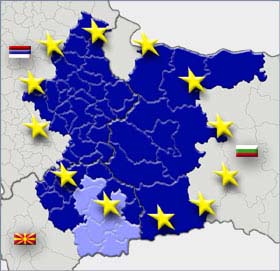|
|
||||||||||||||||||||||||||||||||||||||||||||||
|
Euroregion: english | ńđďńęč | makedonski | bugarski |
||||||||||||||||||||||||||||||||||||||||||||||
|
|
||||||||||||||||||||||||||||||||||||||||||||||
|
|
New Euroregion in South- Eastern Europe - Euroregion EuroBalkans
On October 26th 2002, 66 mayors signed the protocol on the establishment of a new Euroregion in the border region between Bulgaria, Macedonia and Serbia
Why Cross-Border Co-operation? New qualities of Borders
Cross-border co-operation as a means for reconciliation and regional development, going back to the 50s of the last century, proved to be an important tool for the integration and development process in Europe after 2nd World War. One can follow the experience and the tangible results achieved through “Euroregions”, being established as tools for intensified cross-border co-operation between local and regional communities at the borders mainly between D/F and D/NL or later after 1989 at Central and Eastern European borders. Main motives hereby as motors for such initiatives can be described through the main challenges, which border regions were and still are facing: the transformation of the border from a line of separation into a place of communication and co-operation between neighbours; the overcoming of mutual animosities and prejudices between peoples of border regions which result from historical heritage; the strengthening of democracy and the development of operational regional/local administrative structures; the overcoming of national peripherality and isolation; the promotion of economic growth and the development and improvement of living standards; the rapid approach towards and integrated Europe, just to mention a few of them.
Looking at the Balkans, it seems that after a decade of instability and conflict, all the SEE countries work on an enhanced reform process that has as one of the objective the EU membership. Still the international community as well a serious number of opinion leaders in the region are trying to promote the idea of “first achieving visible results on the integration process within the Southeast European Peninsula, as a precondition or first step towards the overall European Integration process.
If on the level of national governments and their official foreign policy it sometimes seems that the “close cross-border co-operation and good relations of neighbours”- declarations, tend to keep a certain abstract approach, such co-operation on the level of local authorities is based on tangible common needs and interests, at the same time being much more close to the citizens. Nowhere more so than in the border regions of neighbouring states is the necessity of avoiding a return to the previous state systems clear to everyone. That which is often merely a European theory for "Inlanders" is usually the daily practical reality for those people living on the border regions. It is these people who mostly suffer the consequences of the existence of the borders and as such they would like to remove the cause of their problems. It is therefore the aim of the work in the border regions and of the cross border co-operation to remove any barriers and separating factors within these regions and to achieve the eventual surmounting of the border, or possibly a reduction in the significance of the administrative border. Within the framework of European integration and the developing economic co-operation, the people of the border regions must also have the right to equal living standards within the new shape of Europe. "The human face" of European politics should be most evident in those places where the will to co-operate is vitally important - i.e. in the border regions. The barriers must continue to be removed here and the "backs to each other" life style will be changed into a "face to face" lifestyle.
Therefore, if we are striving for real content-based co-operation between the people of the Balkan countries, in order to jointly bring the region to the right development track, Euroregions, established mostly in border triangles, should be seen as motors, boosting socio-economic and socio-cultural development and changing the qualities of borders. This is surely one of the reasons why one of the new priorities of the Stability Pact for SEE is the support to the local community development and cross-border co-operation process.
|
|
|||||||||||||||||||||||||||||||||||||||||||
|
|
||||||||||||||||||||||||||||||||||||||||||||||
|
|
||||||||||||||||||||||||||||||||||||||||||||||


